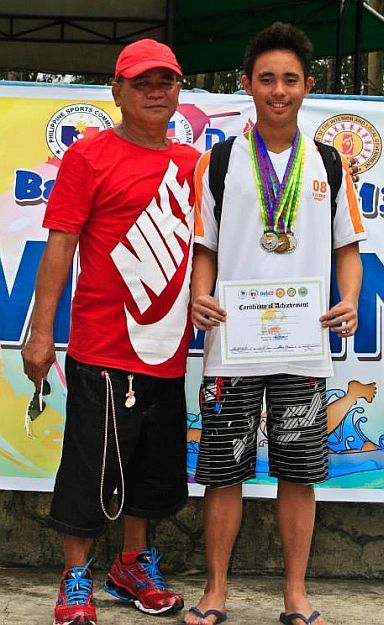
A 2014 photo of swimmer Michael Ichiro Kong with Coach Lando Alvarez (left) during a swimming competition in Bacolod City. Kong, 18, who calls his coach a “hero,” has been training with Alvarez since he was eight years old. (CONTRIBUTED PHOTO)
Coach Rolando Alvarez does not have biological children.
But he has been a father more than a thousand times — nurturing, both
personally and professionally, young students to become professional athletes since he established the Cebu Blue Marlins (CBM) Swimming Club in 1992.
“I don’t believe in the impossible. I believe that each person can be taught how to swim as long as there is determination and prayers,” says Alvarez, a native of Talisay City.
Alvarez, 62, is strict, and he implements a rigid training program for athletes under him.
Like a good father, he watches over them, tells them what they are doing wrong and calls them for a one-on-one dialogue when the need arises.
For 18-year-old Michael Ichiro Kong, the coach is a “hero.”
Kong has trained with Alvarez since he was eight years old and has gone on to win several swimming competitions after undergoing intense physical training.
“Coach Lando is a disciplinarian. He is strict with his athletes, but deep down inside, he loves us all as his own children. I salute him because he was able to overcome the different life challenges,” says Kong.
Polio
Alvarez was only six months old when the doctor told his parents that he has polio.
For most of his childhood, Alvarez was teased and called many names including “kimpang” (cripple) and “disable.”
“I felt bad, but I did not let those harsh words get to me. I decided I can be greater than my disability. I became active in sports. There were more jeers and harsh words because it was not common to see a person whom they call kimpang active in physical education,” he recalls.
The second among five siblings, Alvarez grew up in a “peryahan,” a downsized and local version of a carnival, where he learned gymnastics and acrobatics.
He wanted to earn a degree in civil engineering. But times were hard and money was difficult to earn. On his second year, he dropped out of college.
“It was heartbreaking. My parents could not afford the cost of my education, so I decided I can just find a way to make money and build a career with the skills that I have,” he says.
In 1976, after honing his talents from performing in the peryahan, climbing trees and swimming in the waters of Talisay, Alvarez applied as a coach at the Maroca swimming pool.
He got accepted, and from there, he built his career in coaching. He also taught biking, gymnastics and, at some point, dancing.
Today, CBM has 50 athletes who are part of the club.
CBM swimmers train at the Cebu City Sports Complex (formerly the Abellana Sports Complex). Alvarez also partners with the Cebu City Sports Commission, accepting poor but deserving scholars to train under him.
Only half the number pays Alvarez a monthly professional fee as several club members come from poor families and are training to maximize their skills to be able to get athletic scholarships from colleges and universities.
Alvarez helps them become better athletes so they can pursue their dreams of finishing a degree, something that he was not able to accomplish.
“Training to be an athlete requires discipline. I always tell them to never use their training as an excuse for poor school performance. They must learn to strike a balance,” he says.
Advocacy
CBM was established in 1992 when Alvarez was inspired to set up an organization that can produce top-caliber swimmers from Cebu.
For 25 years, the coach has transformed young athletes into seasoned professional swimmers competing in national and international competitions.
Alvarez also trained children with disabilities, Badjao children, children in conflict with the law and special children.
“Balanced education is a triumvirate of the athlete, the parent and the coach. When these three come together, the child will learn,” he says.
Locally, he is a supporter of the Olango Challenge (OC), described by Alvarez as an annual “swimming competition that helps other people”.
CBM swimmers have been part of the OC since it started in 2008.
Organized by the Philippine Business for Social Progress, OC is an open-water swimming competition which has gathered 700 swimmers in the last nine years and raised more than P12 million to build nine classroom buildings on Olango Island.
“Swimming is not just about winning. It’s also about the dedication and the motivation that they have to inspire them to succeed,” he says.